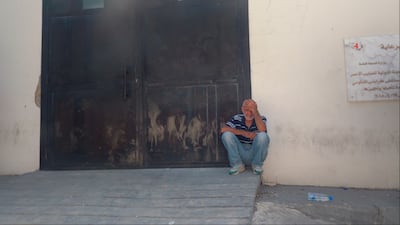For the last three days, Hasan Mohamed and his family have been living off food donations and sleeping in their cars outside a Beirut hospital.
His son Ahmed is one of at least 79 wounded in a deadly fuel tanker explosion in the impoverished region of Akkar, north Lebanon. The blast killed at least 28 people on Sunday, stirring anger in a region long neglected by the central government.
The army had seized the tanker and was distributing the fuel to residents desperate for petrol amid severe shortages when the vehicle exploded.
Akkar victims are the latest casualties of the shortages and lawlessness brought on by Lebanon's economic collapse.
“We have been living in constant humiliation,” said Mr Mohamed, as he held a can of juice in the car park. “Our leaders run to us during election season but the rest of the time, they don’t care."
Mr Mohamed's family does not have enough fuel to drive from the hospital to Akkar and sleep at home due to Lebanon's chronic petrol shortages. They cannot afford the high black market prices either.
In the heat of August, at noon on Tuesday, families gathered in the car park of the Geitawi hospital, where a handful of volunteers distributed water bottles, juice and food to relatives of explosion survivors.
The blast initially sparked an outcry, yet a few days after the incident, victims' families say they have largely been forgotten by their leaders in their time of need.
Huddled in the corner of the car park, his children and wife refuse to leave Ahmed, who is in the hospital. They wait outside, except during visiting hours. Mr Mohamed, who is unemployed, said he and his wife had already lost a son in an accident before the explosion.
“She cannot bear to lose another,” he said.
Lebanon’s economic collapse has created severe shortages of basic goods from fuel to medicine and, in north Lebanon, even bread. The shortages have forced hospitals to ration medication and fuel, needed to power private generators.
Much of the country is without electricity and long queues at petrol stations have become common.
The explosion has come to symbolise the human cost of Lebanon’s collapse. Desperate people died for a few litres of scarce fuel, a survivor told The National.
On Tuesday, Lebanese army veteran Samir Khodr lay in a dimly lit hospital room with weak air conditioning, his body wrapped in bandages. He shivered as he recalled the blast.
“I saw my son’s whole body take fire from his legs to his head,” the father of eight said. He blamed the politicians for hoarding fuel.
His son is in the hospital's special centre for burn patients on another floor, recovering from severe wounds.
Mr Khodr said: “I am ready to die for a cause, but to die for fuel? What did we do to deserve this?”
His roommate is a young soldier with bandages on his face and body.
The Lebanese army says that 24 soldiers have been either killed or wounded in the explosion. With little job opportunities in the region, many residents of Akkar have sought stable jobs in the army.
Hoarded fuel
Since the blast, authorities have intensified anti-smuggling operations and seized millions of litres of hoarded fuel.
Akkar is a major route for the smuggling of subsidised Lebanese goods, such as fuel, to bordering Syria, even as these goods become scarce in Lebanon.
Fawzi Hammad, a retired labourer from Akkar, says the explosion killed three of his relatives and left his son Saleh with severe burns.
He says he could barely afford the 100,000 Lebanese pound ($5 at the market rate) bus ride to Beirut.
“Lebanese leaders have burnt the country and turned us into beggars,” he said, sitting on a bed that was left in the waiting area next to Saleh’s room. "We have no one to rely on."
Angry protesters have accused local members of parliament of neglecting their community and profiting from the smuggling operations.
They attempted to storm the houses of Akkar MPs on Sunday and broke into the home of local parliamentarian Tarek Merhebi.
The Akkar tragedy came a few days after the anniversary of the Beirut explosion, in which more than 214 people perished.
Layale Olaymoun, a critical care physician in charge of Akkar patients at Geitawi hospital said that when patients poured in from Akkar, it reminded her of the Beirut blast on August 4 last year.
“The whole hospital was destroyed in the [Beirut] blast but we treated patients anyway,” she said. “We did the same thing when patients poured in from Akkar and we will continue to do our job.”


